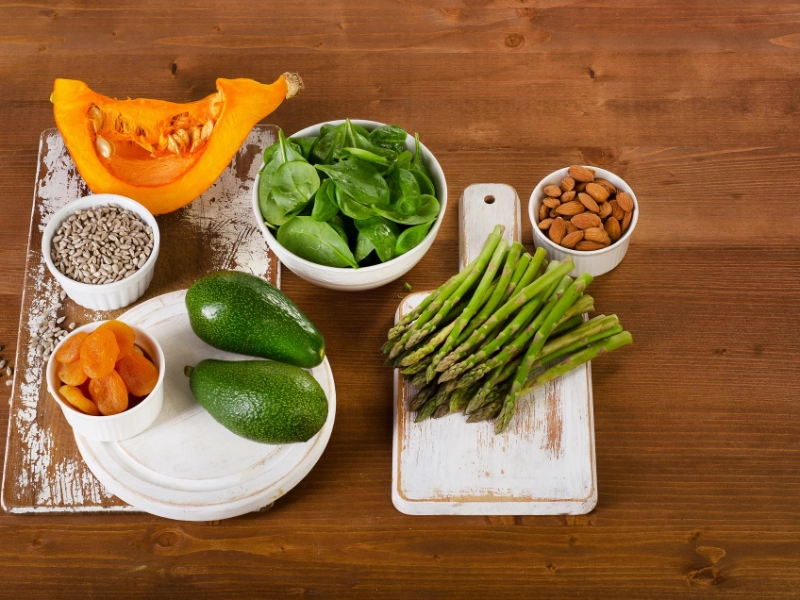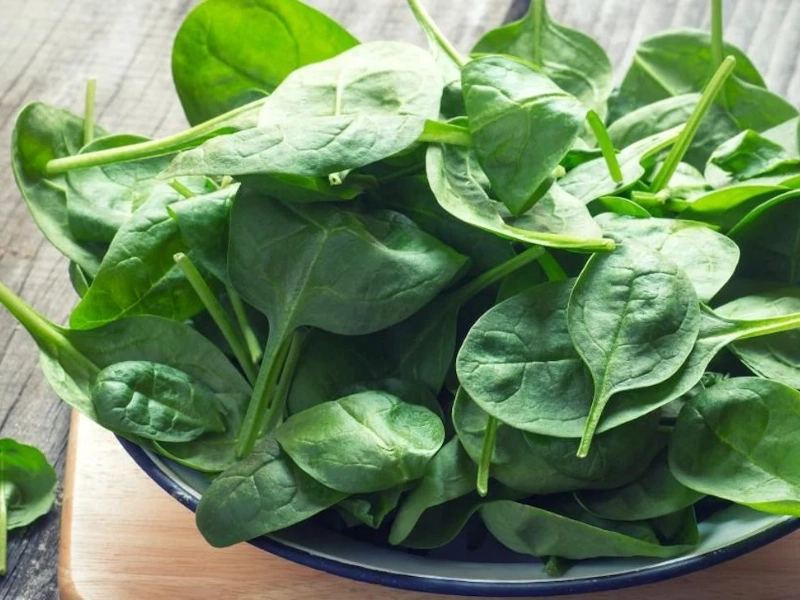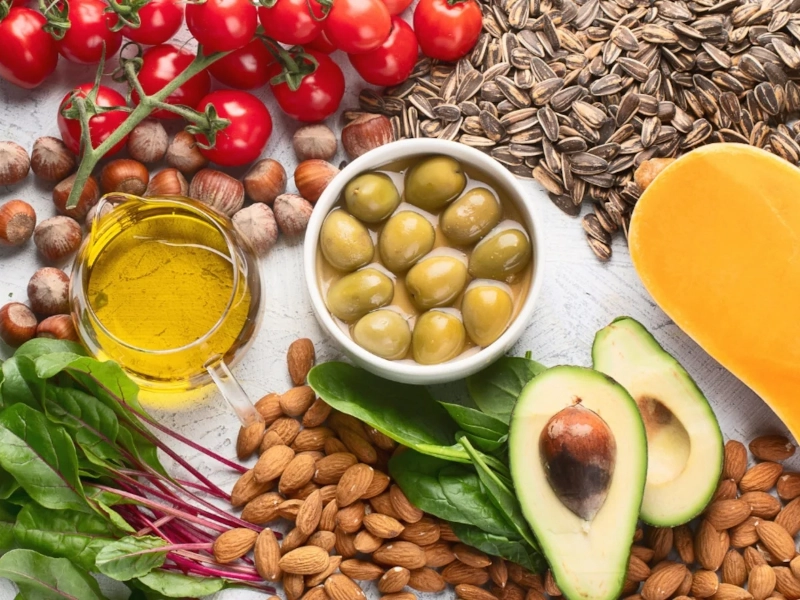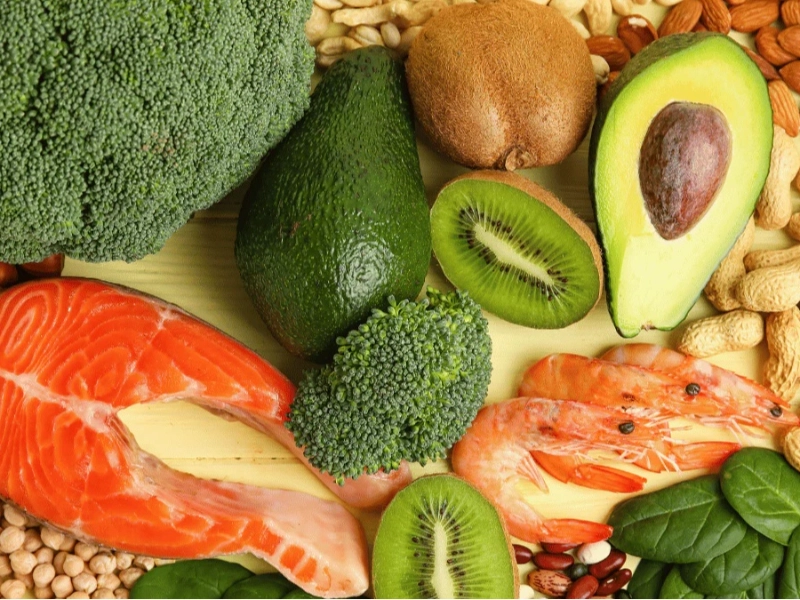Advertisement

Advertisement
1. Muscle Strength: Its Significance Part of general physical performance and fitness is muscle strength. It is absolutely vital for daily activities, sports performance, and injury avoidance. Strong muscles help metabolic health, increase balance, and boost endurance. Maintaining muscle strength becomes more critical as people age or participate in physical activities. Exercise, nutrition, and enough rest are among the several elements influencing muscular strength. Among these, the importance of particular vitamins—such as Vitamin E—has attracted interest for their possible advantages in maintaining muscular condition and performance.
2. Recognizing Vitamin E One fat-soluble antioxidant that is absolutely essential for shielding cells from oxidative damage is vitamin E It comes in numerous forms; the most active and well-researched is alpha-tocopherol. Foods containing this vitamin abound: nuts, seeds, vegetable oils, and leafy greens among others. Neutralizing free radicals generated during physical activity and metabolism requires antioxidants such as Vitamin E. Vitamin E is a vital supplement for those who exercise since it may help preserve muscle integrity and encourage recovery by lowering oxidative damage.

3. The Part Antioxidants Play in Muscle Function Free radicals generated by the body during vigorous exercise can cause oxidative stress and muscular tiredness. This oxidative stress might reduce muscle performance and recuperation, therefore compromising athletic ability. By neutralizing free radicals, antioxidants such vitamin E assist fight oxidative stress and hence shield muscle cells from injury. Vitamin E may increase muscle endurance and strength by helping cellular health, so enabling better performance during physical exercise.
4. Vitamin E and Muscle Repair Any training program depends critically on muscle recovery. Muscles injury during demanding activity that must be healed for best performance. By lowering inflammation and encouraging healing, vitamin E has been demonstrated to help with recovery. Studies indicate that sufficient vitamin E levels may improve muscle healing following injury caused by exercise, so enabling athletes to more rapidly and successfully resume their training programs. For those involved in high-intensity or endurance activities especially, this recovery support may be quite helpful.
5. Vitamin E Supplies Given that vitamin E is found in many foods, including some really simple items, including into the diet is rather simple. Among the richest sources include nuts (like almonds and hazelnuts), seeds (such sunflower seeds), vegetable oils (such sunflower and olive oil), and green leafy vegetables (such spinach and broccoli). Including these items into meals and snacks can be a good way for people trying to increase their vitamin E intake. There are also vitamin E pills, but before beginning any kind of supplementation, it's best to see a doctor.

6. The Relationship Among Vitamin E and Exercise Performance Studies on the link between exercise performance and vitamin E levels have looked at Higher vitamin E levels have some researchers pointing to better muscle strength and endurance than lower levels among athletes. This relationship implies that enough vitamin E may support physical performance, especially in endurance sports where oxidative stress is more evident. More study is required, though, to completely grasp the degree of this link and the ideal Vitamin E doses for performance enhancement.
7. Other Vitamins Supporting Muscle Strength Although vitamin E is quite important for maintaining muscle strength, it is important to understand that it performs best in concert with other nutrients. Muscle repair and growth depend on proteins; carbohydrates give the energy required for exercise. Additionally supporting muscular function and strength are minerals and vitamins including vitamin D, calcium, and magnesium. Maximizing physical performance and general health depends on a balanced diet including a range of nutrients.

8. The Value of a Restrained Diet Maintaining a balanced diet should help people optimize the advantages of Vitamin E and other nutrients for muscle strength. This covers several fruits, vegetables, entire grains, lean proteins, and good fats. Such a diet helps general health and well-being in addition to offering necessary vitamins and minerals. Furthermore vital is proper hydration since it helps muscles to perform and nutrients to be transported. Those who give a balanced diet top priority will improve their physical performance and help muscles to be strong.
9. Lifestyle Factors Affecting Muscle Strength Apart from diet, other elements of lifestyle might affect muscular function and strength. Building and preserving muscle mass depends on regular physical activity including aerobic exercise and strength training. Furthermore essential is enough sleep since it helps the body heal and regenerate itself. Techniques for stress management including mindfulness and relaxation activities help to enhance general health and physical performance even more. Individuals can maximize their muscle strength and performance by tackling lifestyle elements in addition to appropriate diet.
10. Synopsis of Vitamin E's Part in Muscle Strength By virtue of its antioxidant qualities, vitamin E is a vital component supporting muscle strength and athletic performance. Vitamin E is a great supplement to the diets of people who exercise since it lowers oxidative stress and supports recuperation, therefore improving muscle function and endurance. Along with other vital nutrients and good lifestyle choices, including foods high in vitamin E into a balanced diet will help to strengthen muscles generally. Adopting a comprehensive approach to nutrition and exercise will enable people to reach their objectives related to physical performance.

 3. The Part Antioxidants Play in Muscle Function Free radicals generated by the body during vigorous exercise can cause oxidative stress and muscular tiredness. This oxidative stress might reduce muscle performance and recuperation, therefore compromising athletic ability. By neutralizing free radicals, antioxidants such vitamin E assist fight oxidative stress and hence shield muscle cells from injury. Vitamin E may increase muscle endurance and strength by helping cellular health, so enabling better performance during physical exercise.
4. Vitamin E and Muscle Repair Any training program depends critically on muscle recovery. Muscles injury during demanding activity that must be healed for best performance. By lowering inflammation and encouraging healing, vitamin E has been demonstrated to help with recovery. Studies indicate that sufficient vitamin E levels may improve muscle healing following injury caused by exercise, so enabling athletes to more rapidly and successfully resume their training programs. For those involved in high-intensity or endurance activities especially, this recovery support may be quite helpful.
5. Vitamin E Supplies Given that vitamin E is found in many foods, including some really simple items, including into the diet is rather simple. Among the richest sources include nuts (like almonds and hazelnuts), seeds (such sunflower seeds), vegetable oils (such sunflower and olive oil), and green leafy vegetables (such spinach and broccoli). Including these items into meals and snacks can be a good way for people trying to increase their vitamin E intake. There are also vitamin E pills, but before beginning any kind of supplementation, it's best to see a doctor.
3. The Part Antioxidants Play in Muscle Function Free radicals generated by the body during vigorous exercise can cause oxidative stress and muscular tiredness. This oxidative stress might reduce muscle performance and recuperation, therefore compromising athletic ability. By neutralizing free radicals, antioxidants such vitamin E assist fight oxidative stress and hence shield muscle cells from injury. Vitamin E may increase muscle endurance and strength by helping cellular health, so enabling better performance during physical exercise.
4. Vitamin E and Muscle Repair Any training program depends critically on muscle recovery. Muscles injury during demanding activity that must be healed for best performance. By lowering inflammation and encouraging healing, vitamin E has been demonstrated to help with recovery. Studies indicate that sufficient vitamin E levels may improve muscle healing following injury caused by exercise, so enabling athletes to more rapidly and successfully resume their training programs. For those involved in high-intensity or endurance activities especially, this recovery support may be quite helpful.
5. Vitamin E Supplies Given that vitamin E is found in many foods, including some really simple items, including into the diet is rather simple. Among the richest sources include nuts (like almonds and hazelnuts), seeds (such sunflower seeds), vegetable oils (such sunflower and olive oil), and green leafy vegetables (such spinach and broccoli). Including these items into meals and snacks can be a good way for people trying to increase their vitamin E intake. There are also vitamin E pills, but before beginning any kind of supplementation, it's best to see a doctor.
 6. The Relationship Among Vitamin E and Exercise Performance Studies on the link between exercise performance and vitamin E levels have looked at Higher vitamin E levels have some researchers pointing to better muscle strength and endurance than lower levels among athletes. This relationship implies that enough vitamin E may support physical performance, especially in endurance sports where oxidative stress is more evident. More study is required, though, to completely grasp the degree of this link and the ideal Vitamin E doses for performance enhancement.
7. Other Vitamins Supporting Muscle Strength Although vitamin E is quite important for maintaining muscle strength, it is important to understand that it performs best in concert with other nutrients. Muscle repair and growth depend on proteins; carbohydrates give the energy required for exercise. Additionally supporting muscular function and strength are minerals and vitamins including vitamin D, calcium, and magnesium. Maximizing physical performance and general health depends on a balanced diet including a range of nutrients.
6. The Relationship Among Vitamin E and Exercise Performance Studies on the link between exercise performance and vitamin E levels have looked at Higher vitamin E levels have some researchers pointing to better muscle strength and endurance than lower levels among athletes. This relationship implies that enough vitamin E may support physical performance, especially in endurance sports where oxidative stress is more evident. More study is required, though, to completely grasp the degree of this link and the ideal Vitamin E doses for performance enhancement.
7. Other Vitamins Supporting Muscle Strength Although vitamin E is quite important for maintaining muscle strength, it is important to understand that it performs best in concert with other nutrients. Muscle repair and growth depend on proteins; carbohydrates give the energy required for exercise. Additionally supporting muscular function and strength are minerals and vitamins including vitamin D, calcium, and magnesium. Maximizing physical performance and general health depends on a balanced diet including a range of nutrients.
 8. The Value of a Restrained Diet Maintaining a balanced diet should help people optimize the advantages of Vitamin E and other nutrients for muscle strength. This covers several fruits, vegetables, entire grains, lean proteins, and good fats. Such a diet helps general health and well-being in addition to offering necessary vitamins and minerals. Furthermore vital is proper hydration since it helps muscles to perform and nutrients to be transported. Those who give a balanced diet top priority will improve their physical performance and help muscles to be strong.
9. Lifestyle Factors Affecting Muscle Strength Apart from diet, other elements of lifestyle might affect muscular function and strength. Building and preserving muscle mass depends on regular physical activity including aerobic exercise and strength training. Furthermore essential is enough sleep since it helps the body heal and regenerate itself. Techniques for stress management including mindfulness and relaxation activities help to enhance general health and physical performance even more. Individuals can maximize their muscle strength and performance by tackling lifestyle elements in addition to appropriate diet.
10. Synopsis of Vitamin E's Part in Muscle Strength By virtue of its antioxidant qualities, vitamin E is a vital component supporting muscle strength and athletic performance. Vitamin E is a great supplement to the diets of people who exercise since it lowers oxidative stress and supports recuperation, therefore improving muscle function and endurance. Along with other vital nutrients and good lifestyle choices, including foods high in vitamin E into a balanced diet will help to strengthen muscles generally. Adopting a comprehensive approach to nutrition and exercise will enable people to reach their objectives related to physical performance.
8. The Value of a Restrained Diet Maintaining a balanced diet should help people optimize the advantages of Vitamin E and other nutrients for muscle strength. This covers several fruits, vegetables, entire grains, lean proteins, and good fats. Such a diet helps general health and well-being in addition to offering necessary vitamins and minerals. Furthermore vital is proper hydration since it helps muscles to perform and nutrients to be transported. Those who give a balanced diet top priority will improve their physical performance and help muscles to be strong.
9. Lifestyle Factors Affecting Muscle Strength Apart from diet, other elements of lifestyle might affect muscular function and strength. Building and preserving muscle mass depends on regular physical activity including aerobic exercise and strength training. Furthermore essential is enough sleep since it helps the body heal and regenerate itself. Techniques for stress management including mindfulness and relaxation activities help to enhance general health and physical performance even more. Individuals can maximize their muscle strength and performance by tackling lifestyle elements in addition to appropriate diet.
10. Synopsis of Vitamin E's Part in Muscle Strength By virtue of its antioxidant qualities, vitamin E is a vital component supporting muscle strength and athletic performance. Vitamin E is a great supplement to the diets of people who exercise since it lowers oxidative stress and supports recuperation, therefore improving muscle function and endurance. Along with other vital nutrients and good lifestyle choices, including foods high in vitamin E into a balanced diet will help to strengthen muscles generally. Adopting a comprehensive approach to nutrition and exercise will enable people to reach their objectives related to physical performance.